- Home
- Brian Garfield
Hopscotch Page 5
Hopscotch Read online
Page 5
“I’d hate to turn in an uncooperative report on you.”
Saint-Breheret threw up his hands. “You would have my blood!”
He worked a full day on the documents. First he penciled in each letter lightly in outline; then he forged carefully with a straight pen with several nibs. He could have had Saint-Breheret do the job—Saint-Breheret was far more accomplished at it—but in time they’d get onto it and question Saint-Breheret and he didn’t want the Frenchman to be able to tell them what names he’d sold Kendig. Saint-Breheret knew the credit cards but that was part of the scheme.
The credit cards were in the name of James Butler and he prepared a passport and a driver’s license in that name; Butler became fifty-four, a management consultant, born in Cincinnati, resident of Arlington. The French passport identified one Alexandre Vaneau, forty-nine, born in Saintes, resident of St. Ouen. The second American passport and license remained blank for the moment because he didn’t want to spend another half day over them.
As James Butler he went over the border to Barcelona and then flew TAP to Lisbon. Butler lost three hundred French francs at the casino in Estoril, spent the night in the Hilton, paid with an American Express card and hired a Volkswagen from Avis in the morning with his BankAmericard. Before noon he left the rented car parked on a lot in Cascais. A man who didn’t give his name—none was asked—took a taxi from Cascais back to Lisbon International and paid the driver fifteen dollars in American cash. At four o’clock, on American Express again, James Butler boarded a Pan Am flight for Dulles International Airport.
Ennui was not a cocoon to be broken out of in one grand flapping metamorphosis. He sat on the plane watching the sunset take shape very slowly while they chased it across the Atlantic. He felt dejected. But he reasoned it was inevitable. The game hadn’t really begun yet; it had been announced but neither the stadium nor the time had been fixed.
Saint-Breheret could be relied on to be indiscreet; he would put them onto James Butler. In that respect the fun would be in deciding how long to keep Butler—how close to allow them to come. That was the key to his enjoyment of the game: and the enjoyment was chiefly his own; Cutter wouldn’t share in it to nearly the same extent because Cutter could afford to blunder all he wanted to. The game was far more taut for Kendig because he needed to make only one mistake and it would be ended.
It was bound to be anticlimactic; that was one thing that troubled him. The game had to be more enjoyable than the endgame: the chase was what had meaning, not the kill. Victory was never as heady as its anticipation had been. In a very real sense it wasn’t whether you won or lost; it was how you played to win.
For Cutter and his minions it would be a dreary business, wasteful and perhaps distasteful. Chickens would suspend their pecking order when there was a weak sick chicken in the coop: they’d all turn on it and peck it to death; but most likely they didn’t take much pleasure in it. Kendig didn’t see Cutter taking great glee from it; Cutter was a cold man but not a vindictive sort.
So Cutter must be primed. Make him mad, Kendig decided. Flaunt yourself. Embarrass him—insult him.
That was it then. Prolong the game. Stretch it until Cutter made a laughingstock of himself. Force it to the point where Cutter’s career was on the line. Make a fool of him and it had to turn out that way.
He smiled a little and was aware of it; the realization made him smile even more. It was infectious. The stewardess smiled back. “Is everything all right, sir? May I get you a drink?”
“I think I’ll go up to the lounge, thanks.”
He went up the self-conscious little spiral stair. They were Americans, most of them; no one else paid to travel first class. Each of them would have some “business” excuse for the vacation to make the fare tax-deductible. One of them was pounding the piano with more ferocity than skill. There was a lot of drinking and a lot of talk: poses struck, laughter forced. It wasn’t the sort of gaiety he could stand. He had one drink and went back down to his seat.
One of them had been a twin for Myerson, right down to the phony smile. He remembered the last summons to the office down the hall on the fourth floor. “I take it you don’t like it much up here. Or are there personal problems perhaps?”
“Has the man on the fifth floor registered displeasure with my performance?”
“You’ve been lackadaisical, you’ve got to admit that.”
“But not sloppy. I’ve done my job.”
“With all the enthusiasm and initiative of a typist third-class.”
“I wasn’t cut out for shifting bureaucratic rubble from one office to another.”
“We did offer you an alternative.”
“Filling out my time decoding telegrams over at NSA?”
“Assistant Deputy Director for Eastern European Affairs. That’s a responsible position, Miles.”
“A ringing title and a big salary and they’d never let me within a mile of action or policy. A nice faceless assistant to an assistant.”
“Miles, you’re fifty years old and by all the medical prognoses we had a year ago, you should have been dead. You had a God damned bullet in your head.”
“It hasn’t affected my brain. I’m still the best field man you’ve got.”
“We don’t get much call for those kinds of skills any more. You’re perfectly aware of that.”
“Sure.”
“Then what’s your beef?”
“Christ I don’t know. I’m just bored.”
“We’re all bored. It’s just another challenge to meet, Miles. We’ve still got to do the job.”
“Why?”
“Because—oh to hell with it.”
“Look—use me for a decoy. Anything.”
“Begging demeans you, Miles.”
“Not as much as being junked like an old car.”
“Damn it, I hate a man who doesn’t know when the party’s over. At least have the grace to know when to go home. If you can’t fit in behind that desk then give me your resignation. You’ll get a full early-retirement disability pension.”
“Wonderful.”
“Well?”
“You’ll have my resignation this afternoon. With parsley.”
“If that’s the way you want it.… Let’s have lunch soon, what do you say?”
Alexandria was a strip town. The long main drag was crowded with impatient kids driving their souped-up cars uselessly about. He walked past a theater that advertised mature adult films. Beyond that was a string of advertising boards along the waiting-bench wall of a bus depot. One of the ads told young men they could get job-training for high-paying skills if they joined the Army. Another begged businessmen to hire unemployed veterans.
He rented a Mustang under the name James Butler and booked himself into a motel near the Interstate. He slept from midnight to nine in the morning and after the rush-hour traffic had dissipated he drove up to Langley and went into a drugstore phone booth and rang the number.
“Farm labor division, may I help you?”
“My field number is four-three-three-eight,” he said. “I’d like to speak with Joseph Cutter. I don’t have his extension.”
– 5 –
WHEN THE PHONE rang Ross was nearer so he picked up. “Seven six two.”
“Who’s this?”
“Leonard Ross. Who’s calling?”
“Kendig. I’d like to speak with Joe Cutter.”
Ross’s jaw dropped. He turned and covered the mouthpiece. “It’s him.”
Cutter took the receiver and sat down on the edge of the desk. He held it an an angle against his ear so that Ross could listen in. “Miles. What a pleasant surprise.”
“I’m glad they put you on it, Joe. I was afraid they might not throw in the first team. I’m flattered. They still respect my talent—and yours.”
“And I got mine from you. I see what you mean. What can I do for you?”
“You’ve read my book?”
“The first chapter.”
�
�Desrosiers ought to have chapter two by now. You’ll probably hear from him today. I ought to mention there are a couple of pages missing from it. I withheld them on purpose. They contain the references to documentary sources and the names of the witnesses who are still alive.”
“Interesting,” Cutter said. Ross leaned closer to catch the tenor of Kendig’s voice. Cutter said, “Have you thought of putting a price on the exclusive worldwide rights?”
“What am I offered?”
“It appears to be a seller’s market, doesn’t it.”
“I’ll give it some thought.”
“Sure,” Cutter said. He changed the subject abruptly: “You could waste a lot of our time and energy, Miles. What are you trying to prove?”
“All I want is revenge.”
“I see. The spy who was thrown out in the cold wants to get even with the people who threw him out there. That what you mean?”
“That’s why I’m writing the book, Joe.”
“In a pig’s eye.”
Ross heard the chuckle on the phone. Cutter said, “That bullet in the head scrambled your brain. You can’t hurt the Agency—it’s like trying to knock down an elephant with a flyswatter.”
“An elephant can choke to death on a flyswatter, Joe.”
“You belong in a rubber room. What’s the real point? What will it take to call you off?”
“It’s too late for that. I’m just going to finish writing my book. I’ll be sending it out to the publishers a chapter at a time. I’ll be withholding a few evidential pages here and there—they’ll be mailed in along with the final chapter. If you haven’t nailed me yet, of course.”
Ross saw a quick grin flick across Cutter’s lips. “So it’s like that. The longer it takes us to catch you, the more damage you’ll do.”
“You’ve got the picture.”
“We’ll have you on toast, Miles.”
“Come off it. Don’t go making any funeral arrangements until you’re sure you’ve got my corpse.”
“None of us wants that.”
“Myerson would like nothing better.”
“Hell, Miles, we’ve already arranged to sell your body to science. But you can still call it off.”
“No point in that. You people need me like the axe needs the turkey. If I stopped writing now it wouldn’t change that.”
“You really want this fox hunt, don’t you.”
“It’s a way to pass the time.”
“Want to know what I think, Miles?”
“Avidly.”
“I think you’ve picked this game because it’s impossible. You’ll have plenty of excuses for your failure. It’s a hell of a cheap shot.”
“You’re talking into a dead phone, Joe. I’ll see you sometime.”
Click.
Ross leaned back. “Of all the—”
“Shut up.” Cutter was jiggling the phone cradle; then he put the instrument back to his mouth. “This is extension seven six two. A call just came in on this line. I want the log on it.”
Ross stood up and went back to his chair. The ashtray beside it was crowded with butts. They’d been waiting three days and every time he’d made a suggestion about taking some action or other Cutter had told him to go ahead if it would make him feel better. Cutter just sat by the phone and waited. It made Ross feel like an ass. He knew how Cutter regarded him: for Cutter people seemed to have glass heads. To Cutter he was a tall excitable kid, an overgrown precocious schoolboy. And the power of Cutter’s personality was such that he’d half convinced Ross he was right in his judgment. Ross was a six-year veteran of the Agency and Cutter was making him feel like a green recruit.
Cutter grunted into the phone and hung it up. He swiveled on the corner of the desk and said, “The son of a bitch.”
“What?”
“It was a local call,” Cutter said. “The son of a bitch is right here in Langley.”
“He must have the balls of a brass gorilla,” Ross said.
“There never was anybody like him.”
“No way to trace that call, is there. Well it’s not such a big town. Shouldn’t we scout around and see if we can spot him?”
“He’ll be halfway to the West Virginia line by now.”
“Then what the hell do you have in mind? Sit on our asses and diddle ourselves until he calls back?”
“He won’t call back,” Cutter said. “He’s said everything he had to say.”
“He didn’t say much of anything.”
“He’s waving a red flag, that’s all. All right, it’s time we got started.”
“Doing what?”
“Collect the composites from the second floor. Get us a conference room for eleven-thirty. And organize some transportation.” Cutter had the phone again. “It’s Cutter,” he said into it, and covered the mouthpiece to talk to Ross again: “I’ll be with Myerson. You chair the conference. You’ll have twelve men. Take them into town and blanket the pay phones. Take the composites. Find out where he made the call from, what he was wearing, what kind of car he’s driving, which way he went when he left.”
“You think we’ll find anybody who noticed?”
“Probably not. But we’ve got to cover it.”
Ross started gathering things together and putting them into his briefcase. Cutter had gone back to the phone:
“Kendig’s here somewhere. In Langley. I’ll want a few more men on it.… Nuts, he’s priority enough. He’s mailed a second chapter out to those publishers. He’s going to keep mailing chapters out until we get him. How long do you want it to take? … No. He says he wants revenge because he got canned but that’s not it. He’s like a bicycle, when it stops moving it falls down. He’s rolling again, that’s all. There’s no point to it beyond the movement itself. As long as he keeps rolling he stays upright, you follow? … Hell I’m not wasting your time. You asked me. Now he’s got to be traveling on phony papers. I’m going to need authority to call on some of the overseas stringers. We’ll have to canvas the dealers. He must have bought papers from somebody, probably before he left Europe.…”
Cutter was still arguing with Myerson on the phone when Ross went out into the corridor.
– 6 –
HE DIDN’T USE the superhighways. There wasn’t any terrible rush and it was remotely possible they’d play the odds and cover the toll roads like the New Jersey Turnpike. The volume and concentration of traffic on those arteries was such that they might feel justified in using up manpower on stakeouts there. So he drove the old forgotten highways around the western suburbs of Philadelphia, up through New Hope and Lumberville, up the truck across the Delaware through Stockton and Flemington and Somerville, route U.S. 22 to Newark Airport. There as James Butler he turned in the rental car to the car agency. Then he took an airport bus into the West Side terminal in Manhattan.
A hunt built its own momentum. Later on they’d be close behind him with their noses to the ground and there wouldn’t be time to sit down and write. The thing to do was to write the whole thing and carry it along with him and post the chapters one at a time; he’d let Cutter’s actions dictate the intervals between mailings.
But it meant he had to go to ground for a period of weeks. The book didn’t have to be very long but certain things had to be covered in detail; he didn’t want to leave them room to squirm out of anything. It had taken him five days to rough out the chapter and another four days to polish it until it satisfied him; the second chapter had taken a bit longer than that. Probably the whole book would run about two hundred pages of typescript, of which he’d already written thirty-five; if he could do forty a week he’d have it finished in four more weeks. That meant hard steady work but it could be done; he wasn’t trying for any literary prizes.
The limit would be self-imposed because they weren’t going to go away no matter how long he took; but if he wasted too much time on it there was a danger he’d relapse and maybe not finish writing it at all. He had to keep the tension on. So he set himself a thirt
y-day limit. It would be just about the right length of time to get Cutter into hot water too.
But before he went to ground he’d have to lay a false trail—something to keep them occupied and leave them looking silly.
Number 748 Third Avenue was a steel-and-glass office tower that had been architected in evident imitation of a sheet of graph paper: as functional as a bayonet and just as warm. He consulted the building directory in the lobby and found IVES, JOHN H., LITERARY AGENCY—3302. He found the proper bank of elevators and touched his thumb to the depressed plastic square; it lit up in response to the heat of his skin and he twisted his thumb slightly, out of habit.
Muzak and two delivery boys accompanied him to the thirty-third floor and he found his way to Ives’s door. A chic receptionist asked him to wait; he sat while the girl talked into an interphone. The desk and shelves were cluttered with an awful mess and the floor was a jumble of opened cartons of books.
A man came through the door. “Mr. Butler? I’m Jack Ives. Come into the office.”
Ives was younger than he’d expected—very tall, glasses, beard, wavy brown hair cut and shaped by someone expensive. He didn’t exactly look distinguished; he looked like a character-actor who specialized in playing distinguished roles, but he was too young for the part and his eyes were too bright and crafty.
The office was as littered as the anteroom. It had the studied elegant decor of a nineteenth-century gentleman’s library but the frantic disorder dispelled that. Ives shut a door behind Kendig and waved him to a chair. “I don’t ordinarily talk speculative books with unknown writers. But I’ve checked with Desrosiers and he tells me I’d better listen to you. Your name’s not Butler, is it.”
“Kendig. Miles Kendig.”
Ives squinted as if trying to place the name.
“You’ve never heard it before. I’m a retired employee of a government agency. My last position there was Deputy Director of the Plans Division.”
“You don’t look the type.”
“Which type?”
“E. Howard Hunt, that type.”

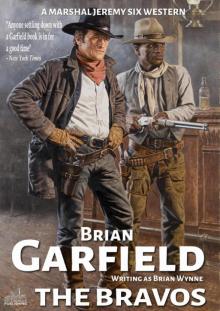 Marshal Jeremy Six #3
Marshal Jeremy Six #3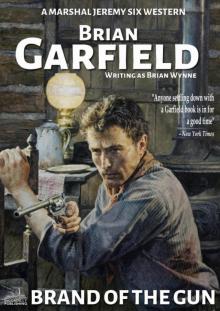 Marshal Jeremy Six #6
Marshal Jeremy Six #6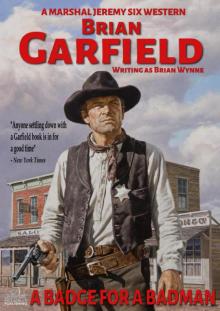 Marshal Jeremy Six #5
Marshal Jeremy Six #5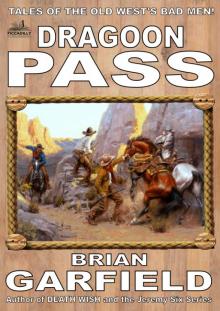 The Outlaws 2
The Outlaws 2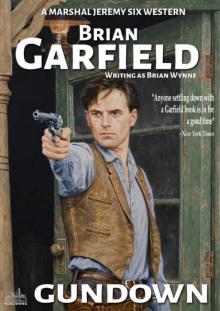 Marshal Jeremy Six #7
Marshal Jeremy Six #7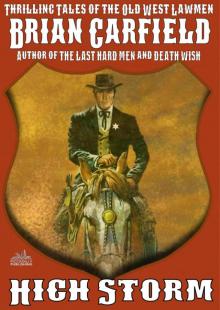 The Lawbringers 4
The Lawbringers 4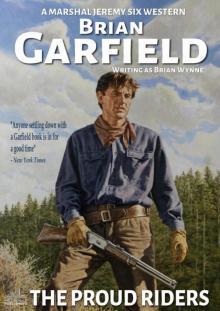 Marshal Jeremy Six #4 the Proud Riders
Marshal Jeremy Six #4 the Proud Riders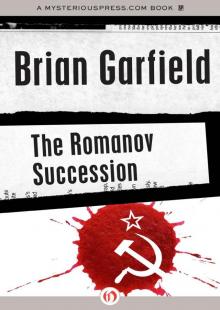 The Romanov succession
The Romanov succession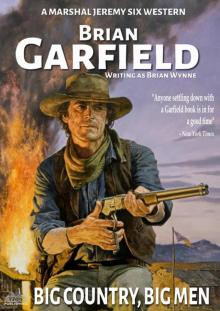 Marshal Jeremy Six #8
Marshal Jeremy Six #8 Sliphammer
Sliphammer Line of Succession
Line of Succession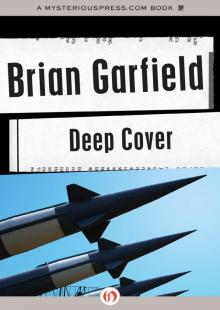 Deep Cover
Deep Cover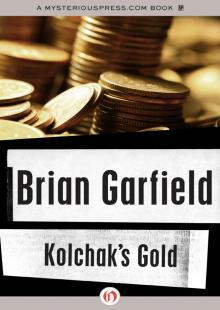 Kolchak's Gold
Kolchak's Gold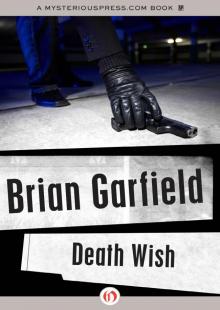 Death Wish
Death Wish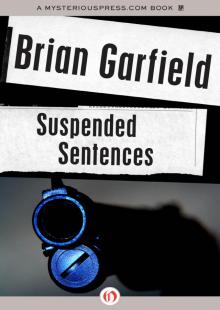 Suspended Sentences
Suspended Sentences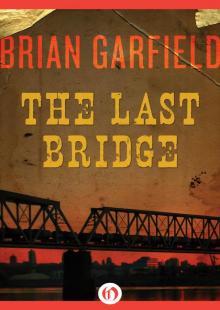 The Last Bridge
The Last Bridge Relentless
Relentless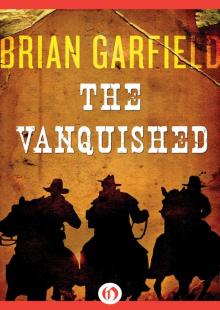 The Vanquished
The Vanquished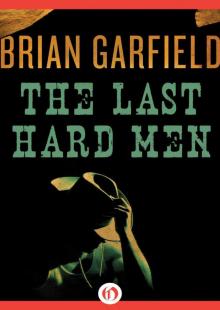 The Last Hard Men
The Last Hard Men Hit and The Marksman
Hit and The Marksman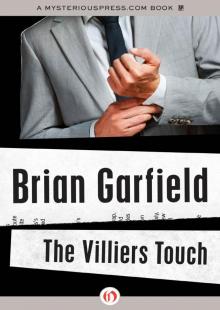 Villiers Touch
Villiers Touch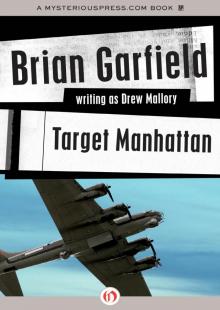 Target Manhattan
Target Manhattan Marchand Woman
Marchand Woman What of Terry Conniston?
What of Terry Conniston?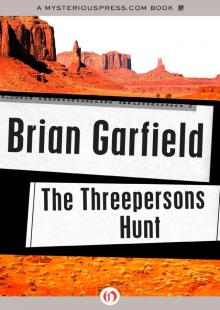 Threepersons Hunt
Threepersons Hunt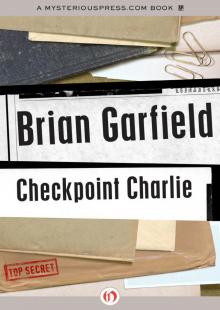 Checkpoint Charlie
Checkpoint Charlie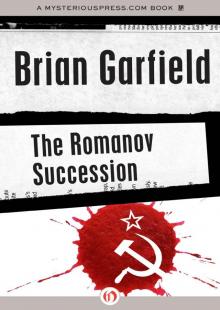 Romanov Succession
Romanov Succession Necessity
Necessity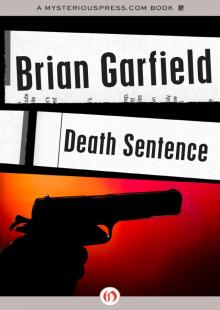 Death Sentence
Death Sentence Fear in a Handful of Dust
Fear in a Handful of Dust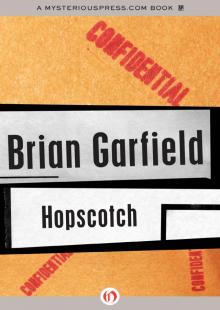 Hopscotch
Hopscotch